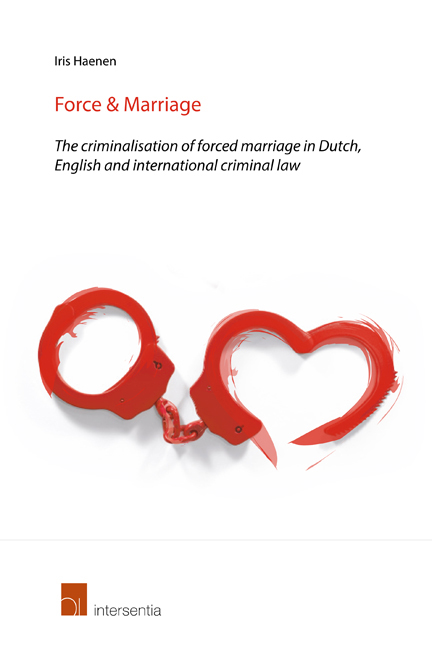 Force & Marriage
Force & Marriage Book contents
- Frontmatter
- Acknowledgements
- Contents
- Abbreviations
- General introduction
- PART I FORCE AND MARRIAGE: Description and definition of forced marriage
- PART II A TALE OF TWO THEORIES: Criminalisation on the level of national law and international law
- Chapter 4 National criminalisation
- Chapter 5 International criminalisation
- Chapter 6 Comparing national and international criminalisation
- PART III THE LAW AND FORCED MARRIAGE: Legal frameworks concerning forced marriage in Dutch, English and international criminal law
- PART IV ANALYSIS AND CONCLUSIONS
- Summary
- Bibliography
- Table of cases
- Curriculum vitae
- Index
Chapter 6 - Comparing national and international criminalisation
from PART II - A TALE OF TWO THEORIES: Criminalisation on the level of national law and international law
Published online by Cambridge University Press: 22 November 2017
- Frontmatter
- Acknowledgements
- Contents
- Abbreviations
- General introduction
- PART I FORCE AND MARRIAGE: Description and definition of forced marriage
- PART II A TALE OF TWO THEORIES: Criminalisation on the level of national law and international law
- Chapter 4 National criminalisation
- Chapter 5 International criminalisation
- Chapter 6 Comparing national and international criminalisation
- PART III THE LAW AND FORCED MARRIAGE: Legal frameworks concerning forced marriage in Dutch, English and international criminal law
- PART IV ANALYSIS AND CONCLUSIONS
- Summary
- Bibliography
- Table of cases
- Curriculum vitae
- Index
Summary
INTRODUCTION
In the previous two chapters, criteria for criminalisation on the level of national and international law were discussed. As announced in the General Introduction to this book, the procedure to uncover these principles differs markedly between the two levels. National criminal law has the benefit of being able to draw from a rich tradition of doctrinal discussions concerning the issue of criminalisation. For international criminal law, this is not (yet) the case; rather, acts have been criminalised on an ad hoc basis throughout the years. Whereas the framework for criminalisation on the level of national law contains a number of clear principles, the same cannot be said for international criminalisation. Due to the specific nature of international criminal law – created, mainly, by diplomats and based on consensus – and the regime of the Rome Statute – limiting the ICC's jurisdiction to the crimes listed in the Statute – the criminalisation framework presented in Chapter 5 looks more like a road map of criminalisation than a schematic collection of principles.
In this chapter, the two ‘frameworks’ for criminalisation are compared to each other. This is done by applying the national criteria listed in Chapter 4 to the international level. This comparison opens up the possibility of cross-pollination between the two levels: some principles that were uncovered as relevant to criminalisation in national law may also be applicable to international law and vice versa. Such a comparison may prove to be fruitful for criminalisation (doctrine) discussions.
HARM AND WRONG: A HIGHER THRESHOLD
International criminal law is a special sort of law: it only deals with the worst crimes imaginable. Crimes against humanity are inhumane acts that cause victims great suffering. War crimes are serious violations of the laws applicable in armed conflict. Genocide, the crime of crimes, is aimed at the destruction of a group of people. In other words, it does not get more serious than that. As a consequence, the harm and wrong principles – which are also condiciones sine quibus non for criminalisation in international law – have higher thresholds in international criminal law than on the level of national criminal law. Minor harms and minor wrongs will not, and should not, be codified in the Rome Statute.
- Type
- Chapter
- Information
- Force & MarriageThe criminalisation of forced marriage in Dutch, English and international criminal law, pp. 185 - 192Publisher: IntersentiaPrint publication year: 2014


